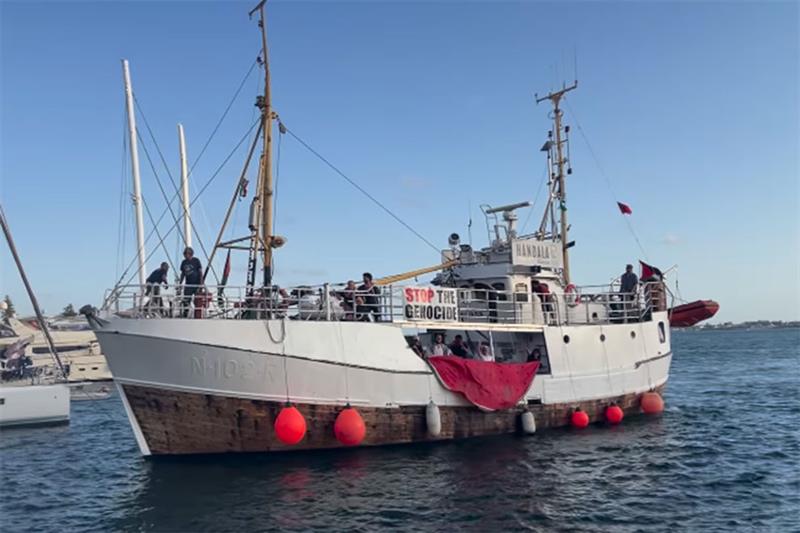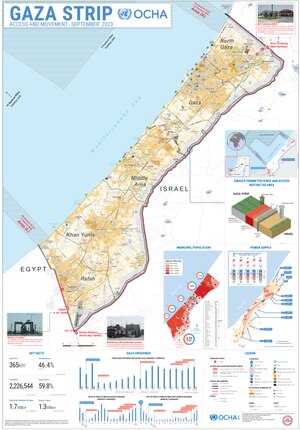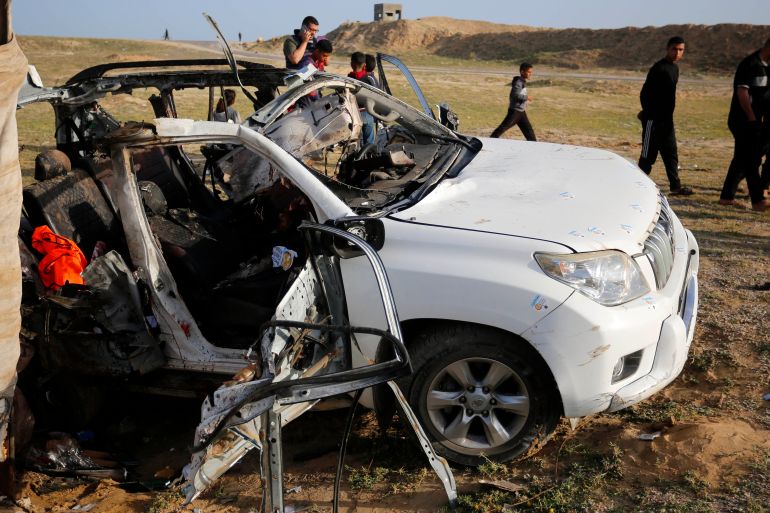The Israeli navy's interception of humanitarian vessels attempting to break the blockade of Gaza has sparked widespread international condemnation. This incident has raised significant questions about the legality and morality of the blockade, which has been in place since 2007. The blockade has had a devastating impact on the Gaza Strip, with the United Nations reporting that over 70% of the population relies on international assistance to survive.
The humanitarian vessels that were intercepted were carrying essential supplies, including food, medicine, and construction materials. The interception of these vessels has been widely criticized, with many arguing that it is a violation of international law. The blockade has been condemned by numerous human rights organizations, including Amnesty International and the International Committee of the Red Cross. Some of the key concerns surrounding the blockade include:
- Restrictions on the movement of people and goods, which has led to a severe shortage of essential supplies
- Limited access to basic services, including healthcare and education
- A significant decline in the overall standard of living for the people of Gaza
According to recent data, the blockade has resulted in a significant decline in the Gaza Strip's economy, with the unemployment rate exceeding 50%. The World Bank has reported that the blockade has cost the Palestinian economy over $3.4 billion since 2007. To make a positive impact, individuals can take the following steps:
- Stay informed about the situation in Gaza and the impact of the blockade
- Support organizations that provide humanitarian aid to the people of Gaza
- Advocate for an end to the blockade and a peaceful resolution to the conflict
It is essential for readers to understand the complexities of the situation and the impact of the blockade on the people of Gaza. By staying informed and taking action, individuals can help bring attention to this critical issue and support efforts to resolve the conflict. The international community must come together to find a peaceful and sustainable solution that addresses the humanitarian needs of the people of Gaza and promotes a lasting peace in the region.

Background of the Freedom Flotilla Coalition
The Freedom Flotilla Coalition has a long and storied history of humanitarian work, dating back to 2008. Since its inception, the organization has been dedicated to providing essential supplies to the Gaza Strip, which has been under an Israeli blockade for over 15 years. The coalition's efforts have been met with both support and resistance, but its commitment to the people of Gaza remains unwavering.
The coalition is a diverse and global entity, comprising international activists, NGOs, and community groups from over 20 countries. Some of the countries represented include:
- The United States
- Canada
- Several European nations, such as the UK, France, and Spain
- Australia and New Zealand
This international scope allows the Freedom Flotilla Coalition to mobilize a wide range of resources and expertise, from fundraising and advocacy to logistical support and media outreach.
To break the Israeli blockade, the Freedom Flotilla Coalition has employed a variety of tactics, including sending aid ships to Gaza and organizing land convoys. According to recent data, the coalition has successfully delivered over 10,000 tons of aid to the Gaza Strip since 2008, including food, medicine, and construction materials. Despite these successes, the coalition faces ongoing challenges, including the risk of ship seizures and arrests of activists. For example, in 2020, the Israeli navy intercepted a Freedom Flotilla Coalition ship, the Al-Awda, and detained several of its crew members.
Readers who want to learn more about the Freedom Flotilla Coalition and its mission can visit the organization's website, which features stories of individual activists and organizations involved. The website also provides updates on the coalition's latest campaigns and initiatives, as well as ways to get involved and support the organization's work. Some practical tips for readers who want to support the Freedom Flotilla Coalition include:
- Donating to the organization or spreading the word about its mission on social media
- Volunteering with local organizations that support the coalition's work
- Contacting elected officials to express support for the coalition's efforts and advocate for an end to the Israeli blockade
By taking these steps, readers can help make a tangible difference in the lives of the people of Gaza and support the Freedom Flotilla Coalition's vital humanitarian work.

The Israeli Blockade of Gaza
The blockade has been in place for over 15 years, with severe consequences for the people of Gaza. The stated goal of preventing Hamas from importing weapons and materials that could be used for military purposes has not been entirely effective, as reports suggest that smuggling continues to thrive. However, the impact on civilians has been profound, with widespread poverty and unemployment affecting over 50% of the population.
Some of the key issues facing the people of Gaza include:
- Shortages of food, water, and medical supplies, with over 90% of the water undrinkable
- High levels of unemployment, with over 50% of the population unemployed
- Poverty, with over 50% of the population living below the poverty line
- Limited access to education and healthcare, with many schools and hospitals severely underfunded
These statistics are alarming, and it is clear that the blockade is having a devastating impact on the civilian population.
To put this into perspective, in 2022, the World Bank reported that the GDP per capita in Gaza was just $1,700, compared to $43,600 in Israel. This disparity is stark, and it is clear that the blockade is exacerbating the economic situation in Gaza. Furthermore, the United Nations has warned that Gaza is on the verge of becoming "uninhabitable" due to the blockade, with severe shortages of food, water, and medical supplies.
So, what can be done to address this situation? Readers can take action by contacting their elected representatives and expressing support for policies that promote humanitarian aid and an end to the blockade. Some practical steps include:
- Contacting your local representative to express your concerns about the blockade
- Supporting organizations that provide humanitarian aid to Gaza, such as the United Nations Relief and Works Agency (UNRWA)
- Spreading awareness about the issue through social media and other channels
- Advocating for policies that promote peace and reconciliation in the region
By taking these steps, readers can help to bring attention to this critical issue and push for a resolution that promotes the well-being and dignity of the people of Gaza.

International Response to the Interception
The international community has been swift in its condemnation of the interception, with numerous governments and non-governmental organizations (NGOs) issuing statements and calling for action. Many countries have expressed their concern over the incident, citing the need for a peaceful resolution to the conflict and an end to the blockade. For example, the European Union has called for an immediate lifting of the blockade, while the United States has expressed its concern over the loss of life and the need for a full investigation.
The United Nations has also played a key role in responding to the incident, with the Secretary-General issuing a statement expressing concern over the violence and calling for a peaceful resolution. The UN has a long history of involvement in the conflict, and its response to the interception is just the latest example of its efforts to promote peace and stability in the region. Some of the key actions taken by the UN include:
- Calling for a full investigation into the incident
- Expressing concern over the loss of life and the humanitarian situation
- Urging all parties to exercise restraint and work towards a peaceful resolution
These actions demonstrate the UN's commitment to promoting peace and stability in the region, and its determination to hold all parties accountable for their actions.
Readers who want to stay up-to-date on the latest developments can follow reputable news sources, such as the BBC, Al Jazeera, and The New York Times. Social media accounts, such as those of the UN and NGOs, can also provide valuable insights and updates. Additionally, readers can participate in online campaigns and petitions, such as those organized by Amnesty International and the International Committee of the Red Cross. By taking these actions, readers can help to raise awareness about the issue and push for a peaceful resolution to the conflict. For example, in 2020, over 1 million people signed a petition calling for an end to the blockade, demonstrating the power of online activism in bringing about change.
To get involved and make a difference, readers can take the following steps:
- Follow reputable news sources and social media accounts to stay informed
- Participate in online campaigns and petitions to raise awareness and push for change
- Support NGOs and organizations working to promote peace and stability in the region
- Contact their elected representatives to express their concerns and call for action
By taking these steps, readers can help to promote peace and stability in the region, and work towards a resolution to the conflict that respects the rights and dignity of all parties involved.

What You Can Do to Help
The ongoing blockade of Gaza has resulted in a humanitarian crisis, with over 2 million people affected by the lack of access to basic necessities like food, water, and medical care. As of 2022, the unemployment rate in Gaza stands at a staggering 47%, with 53% of the population living below the poverty line. In this context, individual efforts to support the people of Gaza can make a significant difference.
There are various ways to contribute to the cause, including donating to reputable humanitarian organizations that provide aid to those in need. Some notable examples include:
- The United Nations Relief and Works Agency for Palestine Refugees in the Near East (UNRWA), which provides essential services like education, healthcare, and food assistance
- The International Committee of the Red Cross (ICRC), which works to promote respect for international humanitarian law and provide humanitarian aid
- Local non-governmental organizations (NGOs) that focus on specific issues like healthcare, education, and community development
When donating, it is essential to research the organization and ensure that your contribution is being used effectively.
In addition to donating, participating in local activism and advocacy efforts can help raise awareness about the issue and promote action. This can include attending rallies, signing petitions, and engaging with local policymakers to express support for the people of Gaza. For instance, in 2020, thousands of people around the world participated in protests and demonstrations to mark the anniversary of the Great March of Return, a series of protests that began in Gaza in 2018. Readers can also use social media platforms to amplify the voices of those affected by the blockade and share information about the issue with their networks.
To stay informed about the situation in Gaza, it is crucial to follow credible news sources and social media accounts that provide updates on the ground. Some recommended sources include:
- The United Nations Office for the Coordination of Humanitarian Affairs (OCHA), which provides regular updates on the humanitarian situation in Gaza
- Local news outlets like the Gaza-based newspaper Al-Quds, which offers in-depth coverage of the situation
- Human rights organizations like Amnesty International and Human Rights Watch, which document human rights abuses and advocate for accountability
By staying informed and using their voices to raise awareness, readers can help promote action and bring attention to the plight of the people of Gaza.
Ultimately, collective efforts can help bring an end to the suffering of the people of Gaza and promote a more just and peaceful resolution to the conflict. Practical tips for readers include:
- Sharing articles and updates on social media to raise awareness about the issue
- Writing to local policymakers to express support for the people of Gaza and advocate for policy changes
- Participating in local events and activism efforts to show solidarity with the people of Gaza
By working together and using their voices to promote action, readers can make a meaningful difference in the lives of those affected by the blockade.

Frequently Asked Questions (FAQ)
What is the Freedom Flotilla Coalition?
The Freedom Flotilla Coalition is a humanitarian organization that has been at the forefront of efforts to break the Israeli blockade of Gaza and provide essential supplies to the Gaza Strip. Since its inception, the coalition has sent numerous aid ships to Gaza, carrying vital supplies such as food, medicine, and construction materials. These missions have been met with significant challenges, including interception by the Israeli navy, but the coalition remains committed to its goal of providing humanitarian aid to the people of Gaza.
The coalition's efforts are crucial, given the dire humanitarian situation in Gaza. According to recent data from the United Nations, over 70% of the population in Gaza lives below the poverty line, and the unemployment rate is over 50%. The blockade has also had a devastating impact on the healthcare system, with many hospitals and medical facilities lacking essential supplies and equipment. The Freedom Flotilla Coalition's aid ships have helped to alleviate some of these shortages, providing vital supplies such as:
- Medical equipment and supplies, including dialysis machines and hospital beds
- Food and nutrition supplies, including baby formula and flour
- Construction materials, including cement and steel
Despite the challenges it faces, the Freedom Flotilla Coalition remains committed to its mission. The coalition has called on governments and international organizations to take action to end the blockade and ensure that the people of Gaza have access to the humanitarian aid they need. Individuals can also take action to support the coalition's efforts, such as:
- Donating to the coalition's fundraising campaigns to support the cost of aid ships and supplies
- Spreading awareness about the humanitarian situation in Gaza and the importance of breaking the blockade
- Contacting government representatives to urge them to take action to end the blockade
For those looking to get involved, there are several ways to support the Freedom Flotilla Coalition's efforts. The coalition's website provides updates on its latest missions and campaigns, as well as information on how to donate or get involved. Individuals can also follow the coalition on social media to stay up-to-date on its latest activities and campaigns. By working together, it is possible to make a real difference in the lives of the people of Gaza and to help bring an end to the blockade.
Why is Israel blocking aid to Gaza?
The Israeli blockade on Gaza has been a longstanding and highly contentious issue, with far-reaching implications for the region's civilian population. At its core, Israel's justification for the blockade centers on the need to prevent Hamas, a militant Islamist group deemed a terrorist organization by Israel and several Western countries, from acquiring weapons and materials that could be used for military purposes. This rationale is rooted in concerns over national security and the protection of Israeli citizens from potential attacks.
However, critics of the blockade argue that it has had a disproportionate and devastating impact on the civilian population of Gaza. The effects are multifaceted, impacting various aspects of life in Gaza, including:
- Economic stability: The blockade severely limits the import and export of goods, crippling Gaza's economy and leading to high levels of unemployment and poverty.
- Healthcare: Restrictions on the movement of people and goods have resulted in shortages of medical supplies and equipment, compromising the ability of healthcare facilities to provide adequate care.
- Infrastructure: The blockade hinders the reconstruction and development of essential infrastructure, such as housing, schools, and water treatment facilities, which are critical for the well-being and dignity of the population.
Recent data underscores the severity of the situation. As of 2022, the unemployment rate in Gaza stood at approximately 47%, with poverty rates affecting over 50% of the population. The healthcare system is on the verge of collapse, with many hospitals and clinics operating at minimal capacity due to shortages of basic medical supplies. For instance, in 2022, the Gaza Strip faced a severe shortage of medicines, with over 40% of essential drugs and medical supplies at zero stock levels.
To address this complex issue, it is essential for readers to stay informed and consider the multifaceted nature of the blockade. For those looking to make a positive impact, several steps can be taken:
- Support organizations that provide humanitarian aid to Gaza, focusing on essential services like healthcare, education, and economic development.
- Advocate for policies that promote a peaceful resolution to the conflict, including the easing of restrictions that disproportionately affect civilians.
- Engage in respectful and informed discussions about the issue, recognizing the legitimate concerns of all parties involved and seeking solutions that prioritize human rights and dignity.
Ultimately, finding a resolution to the blockade that balances legitimate security concerns with the humanitarian needs of the civilian population in Gaza is crucial. This requires a comprehensive approach that involves diplomatic efforts, international cooperation, and a commitment to upholding human rights and international law. By working together and supporting initiatives that foster peace, stability, and development, it is possible to mitigate the adverse effects of the blockade and create a more hopeful future for the people of Gaza.
How can I help the people of Gaza?
The plight of the people of Gaza is a pressing humanitarian concern that requires immediate attention and action. With a population of over 2 million people, Gaza is one of the most densely populated places on earth, and its residents face numerous challenges, including poverty, unemployment, and limited access to basic necessities like healthcare and education. According to recent data from the United Nations, over 70% of Gaza's population relies on international assistance to survive.
There are many ways to make a positive impact and help the people of Gaza. Donating to humanitarian organizations is a crucial step in providing emergency aid and supporting long-term development projects. Some reputable organizations to consider include:
- UNRWA (United Nations Relief and Works Agency for Palestine Refugees in the Near East)
- UNICEF (United Nations Children's Fund)
- Oxfam International
- Doctors Without Borders/Médecins Sans Frontières (MSF)
These organizations work tirelessly to provide food, shelter, medical care, and other essential services to those in need.
In addition to donating, participating in local activism and advocacy efforts can also help raise awareness and promote action. This can include attending rallies and events, contacting elected officials, and engaging in online campaigns. For example, the #GazaUnderAttack social media campaign has been used to raise awareness about the situation in Gaza and mobilize support for the Palestinian people. By staying informed about the issue and sharing accurate and reliable information with others, individuals can help counter misinformation and promote a more nuanced understanding of the conflict.
To stay informed and take action, consider the following practical tips:
- Follow reputable news sources and humanitarian organizations on social media to stay up-to-date on the latest developments
- Participate in local events and rallies to show support for the people of Gaza
- Contact your elected officials to express your concerns and advocate for policy changes
- Volunteer with organizations that support the people of Gaza, either in-person or remotely
By taking these steps, individuals can make a meaningful contribution to the efforts to support the people of Gaza and promote a more just and equitable solution to the conflict. According to a recent report by the Palestinian Central Bureau of Statistics, the unemployment rate in Gaza has risen to over 50%, highlighting the urgent need for economic support and development initiatives. By working together, we can help address the humanitarian needs of the people of Gaza and promote a brighter future for all.






